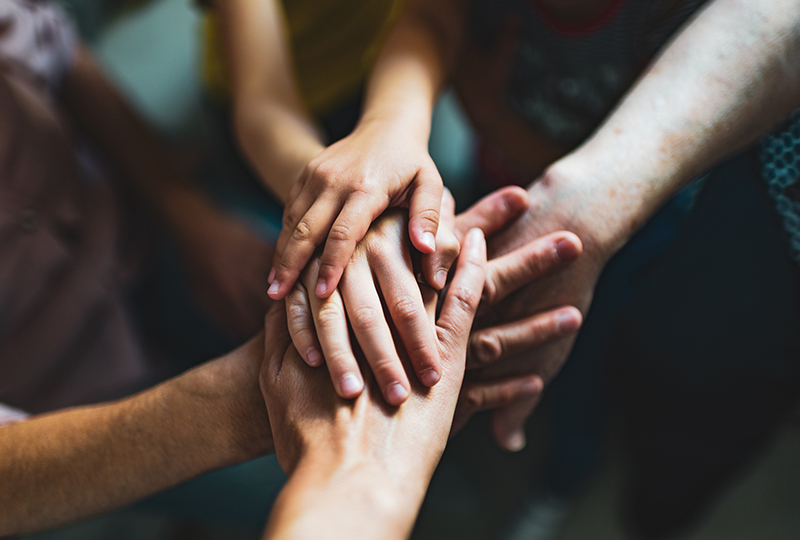When the unthinkable happens, everyone has a role in helping children heal from trauma. Here are tips for parents, teachers and health care providers.
When a community and its children experience a mass trauma like a school shooting or natural disaster, one of the most helpful things they can do is find ways to come together to heal from trauma.
Michelle Reising, PhD, a pediatric psychologist at Monroe Carell Jr. Children’s Hospital at Vanderbilt, said survivors of traumatic events report that vigils, memorials and gatherings with a focus on collective healing and support are incredibly helpful for promoting resilience and recovery within communities. This is especially true if individuals can connect within smaller community groups where they already have a sense of trust and engagement, such as schools, neighborhoods, faith communities or interest groups.
“It’s human nature that we truly heal best with the support of others.”
“Although our first impulse after traumatic events might be to isolate to protect ourselves and our families, it’s human nature that we truly heal best with the support of others,” Dr. Reising said. “We need human connection in the face of tragedy.”
In the days immediately after a traumatic event, such opportunities to gather may be plentiful, but they can wane over time. Reising encouraged families to continue to approach recovery as a group effort, even as time passes from the initial incident. She offered the following tips for parents, teachers and health care providers to help children heal from trauma.
Parents help by being available, non-judgmental and consistent with routines
When the world seems unsafe, parents can help to re-establish a child’s sense of safety by offering reassurance and allowing children to process their feelings without judgment.
“Young children find comfort in consistency and predictability. With older kids, it may be helpful to talk through or even create a family emergency plan that helps them feel safe.”
“After a tragedy, parents can support their children by being emotionally available, non-judgmental and validating of their child’s experiences,” Reising said.
Allie Wroblewski, PhD, a pediatric psychologist with Monroe Carrell, said resuming normal routines is one of the most important things families with young children can do.
“Young children find comfort in consistency and predictability,” Wroblewski said. “With older kids, it may be helpful to talk through or even create a family emergency plan that helps them feel safe.”
They also offered the following tips for parents to help children heal from trauma:
- Limit exposure to media coverage and be mindful of conversations in front of children about the events.
- Allow children to lead conversations about the event and avoid adding overly specific details to responses. It may be helpful to start with broad questions such as “what do you know?” or “what have you heard?”
- Role model adaptive coping mechanisms by demonstrating self-care, sleep hygiene, emotional expression, engagement in enjoyable activities, connecting with social supports, and other healthy positive methods for coping with grief.
For more resources on helping children cope, Reising recommended these resources from the National Child Traumatic Stress Network: after school shootings and after disasters.
Teachers help by partnering with parents, providing classroom accommodations
Teachers can help by keeping the communication lines open with parents to learn what each student is going through and providing the parents with ongoing monitoring of the child’s well-being.
“Teachers can be a vital resource for families as they heal, and this works best when it is approached as a partnership.”
“Teachers can be a vital resource for families as they heal, and this works best when it is approached as a partnership,” Reising said. “If the teacher is aware of the challenges the student is facing, they can provide classroom structure while still allowing for an appropriate amount of increased flexibility around the students’ emotional and behavioral needs.”
Reising added that teachers can also provide perspective for parents to help them determine when a child is distressed and may need additional support.
For teacher-specific guidelines, Reising recommended this resource from the National Child Traumatic Stress Network.
Health care providers help by providing trusted expertise
A family’s trusted health care provider or mental health provider can play a pivotal role in a child’s recovery after a mass tragedy. Parents and community members will naturally turn to them for advice, so it is important that health care leaders educate themselves about childhood trauma so that they can safely fulfill this trusted role.
“Not all health care providers treat trauma on a daily basis, so they should take the time to learn about the expected range of reactions to trauma in children,” Reising said. “This will help them correctly guide parents to the right resources and referrals or help them recognize when a child just needs support processing their reactions to the event and doesn’t need unnecessary medical treatments.”
Children with emotional or behavioral difficulties that do not improve over time or significantly impair functioning may need the help of a health care provider trained to treat childhood trauma. A family’s existing health care providers can help make these referrals.
For more detail, Reising recommended Psychological First Aid and Skills for Psychological Recovery training for health care providers.
Need help?
If your child is struggling, the next best step is to consult your pediatrician, who can assess and make necessary referrals.

